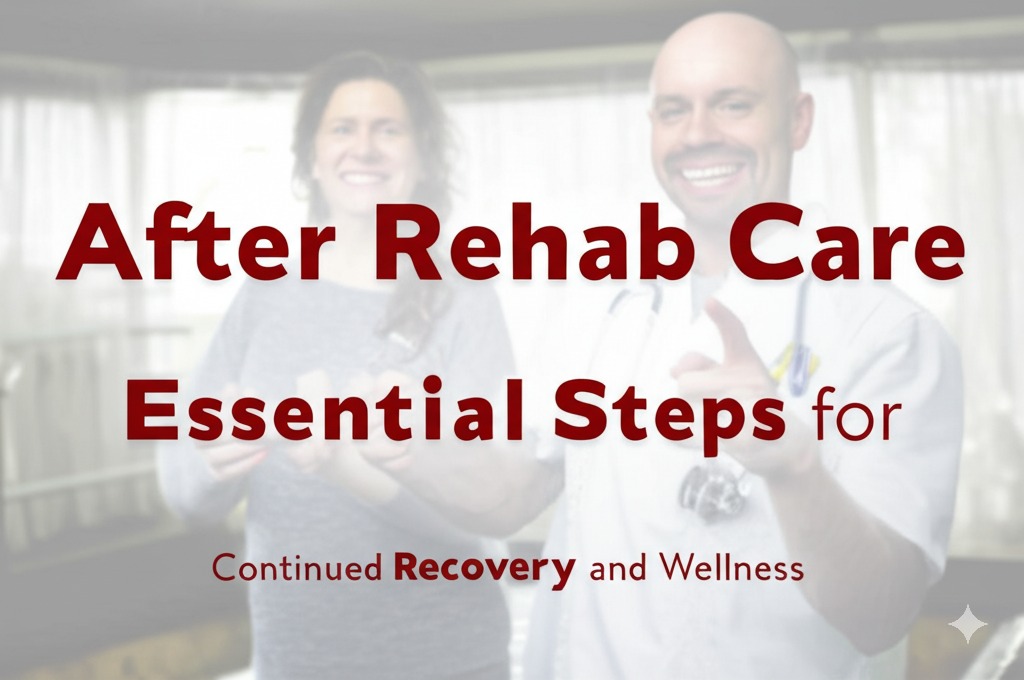Introduction: Recovery from addiction or physical injury is a courageous and life-changing journey. But what happens after the rehab center? The real challenge often begins once the formal treatment process ends. After rehab care is crucial to maintaining the progress made during rehab and ensuring long-term success. In this article, we’ll explore essential aftercare strategies that can help individuals continue their recovery journey with confidence and strength.
What is After Rehab Care? After rehab care refers to the support and resources provided to individuals once they leave a rehabilitation facility. This phase plays a significant role in the recovery process by offering guidance, accountability, and a structured environment that can help prevent relapse or setbacks. Aftercare ensures that the lessons learned in rehab are reinforced and practiced in real-world situations.
Why After Rehab Care is Important
1. Preventing Relapse: Rehabilitation doesn’t end when an individual leaves a treatment facility. Without ongoing support, many individuals may face challenges adjusting to life outside rehab, which can increase the risk of relapse. Aftercare programs, such as support groups, therapy sessions, and counseling, help to create a support system to manage triggers and high-risk situations.
2. Maintaining Mental and Physical Health: After rehab care isn’t just about preventing relapse; it’s about continuing to build mental and physical strength. Regular follow-ups, therapy, and wellness activities like exercise or mindfulness help individuals stay healthy and emotionally balanced.
3. Building a Support Network: One of the most significant aspects of aftercare is connecting with a community of individuals who understand the challenges of recovery. This network can be a lifeline, offering shared experiences, encouragement, and emotional support. Support groups such as Narcotics Anonymous (NA) or Alcoholics Anonymous (AA) are excellent examples of such communities.
Types of Aftercare Programs
1. Outpatient Counseling and Therapy (H3)
After rehab, continued therapy is essential for emotional healing. Outpatient counseling can include individual therapy, group therapy, or family therapy. These sessions help individuals process any lingering emotions and reinforce the coping mechanisms learned during treatment.
2. Support Groups (H3)
Support groups are a cornerstone of aftercare. Whether it’s a 12-step program or a peer-led group, these gatherings provide a sense of camaraderie. Talking with others who are facing similar struggles can significantly reduce feelings of isolation and offer practical advice for dealing with everyday challenges.
3. Sober Living Houses (H3)
For individuals transitioning back to independent living, sober living houses offer a structured and drug-free environment. These homes are typically communal, providing both support and accountability. Residents have access to counseling, therapy, and other resources that aid in long-term recovery.
4. Educational and Vocational Support (H3)
Many individuals in recovery face challenges related to employment and education. Aftercare programs often include vocational training, educational resources, and job placement services to help individuals reintegrate into society and maintain financial independence.
Creating a Personalized Aftercare Plan
1. Individualized Goals (H3)
A successful aftercare plan should be tailored to an individual’s needs and recovery goals. Some people may require more therapy and emotional support, while others may benefit from job training or life skills workshops. The aftercare plan should address personal strengths, weaknesses, and specific circumstances.
2. Accountability and Tracking Progress (H3)
A strong aftercare plan includes regular check-ins with a counselor or recovery coach. These sessions help individuals track their progress, set new goals, and adjust the plan as needed. Accountability ensures that individuals stay committed to their recovery journey and remain on the right track.
Tips for Staying on Track After Rehab
1. Establish a Routine: A structured daily routine can provide stability and reduce the temptation of negative behaviors. This routine should include time for therapy, exercise, self-care, and social activities.
2. Stay Engaged in Recovery: Continually participating in support groups and therapy will help individuals stay connected to their recovery community. Regular involvement in aftercare programs strengthens resilience and reinforces the skills learned during rehab.
3. Focus on Health and Wellness: Physical activity, proper nutrition, and mindfulness practices can significantly improve overall well-being. These habits not only promote physical health but also reduce stress and anxiety, which can trigger relapse.
4. Develop New Hobbies and Interests: Filling free time with hobbies that bring joy and fulfillment is vital in recovery. Pursuing new passions or revisiting old ones can provide a sense of accomplishment and boost self-esteem.
Conclusion: After rehab care is the crucial bridge between treatment and long-term recovery. It’s not just about staying sober or avoiding relapses; it’s about building a healthy, sustainable life. By staying engaged in aftercare programs, maintaining a routine, and focusing on wellness, individuals can continue their recovery journey with confidence and resilience.
If you or someone you know is transitioning from rehab to life outside of treatment, consider speaking to a healthcare professional about creating a personalized aftercare plan. The steps taken during this phase can significantly impact long-term success and overall well-being.

Kallie Snyder is an author at Stonegate Health Rehab, providing valuable insights, recovery guidance, and rehab resources to help individuals achieve better health and well-being.
